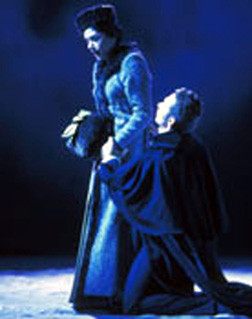Matters of Choice
Eugene
Onegin, Mazeppa
The Kirov Opera and Orchestra of the Mariinsky Theater
Opera House
John F. Kennedy Center for the Performing Arts
December 16, 18, 2003
By
Alexandra Tomalonis
copyright © 2003 by Alexandra Tomalonis
For those holding their breath, wondering if the Kennedy Center Opera House would be ready for the start of the ballet season, it’s safe to exhale. The planners did a splendid job. There was a test show a few weeks ago (which George Jackson reviewed in these pages) to spot possible problems; then the Kennedy Center Honors; and this week, the really truly grand [opera] opening: the Kirov Opera, presenting Tchaikovsky’s Eugene Onegin and Mazeppa as part of a Festival in that composer’s honor. Congratulations to all involved in the renovation. There were no visible last minute glitches; no dangling wires, no “pardon our dust!” signs. The new carpet is in place, those masking tape repairs to the wall covering are gone. Whether my sense of scale has been skewed by several months in the intimate Eisenhower Theater or whether the house really is about 20 percent larger, I can’t say, but it certainly SEEMS bigger. The aisles are twice as wide, the orchestra center section has more seats. The pit is huge, swallowing up the Rows Formerly Known As E and F (this may be adjustable for occasions that require fewer musicians). One quibble is that the seats seem less suited to a theater than a restaurant whose management wants to insure quick turnover. It’s not that they’re hard as Victorian horsehair; that’s rather bracing. It’s that that they seem cut and angled to fit a different species, with low backs and an odd slant that make it difficult for the lower spine and seat back to find each other. But overall, I think patrons will be happy to have their house back.
The Kirov opened last Tuesday with a bare bones production of Eugene Onegin, as the sets and costumes had been destroyed in the recent fire at the Maryinsky. White plastic or Styrofoam blocks were thrown up where, I suppose, buildings and rooms had been. The chorus costumes looked in period, but Tatiana surely would have been spooked by Onegin’s pleather hunting breeches, and she sang her love letter to him wearing a sleeveless nightie. I had gone hopin—expecting—to see a stage full of waltzing partygoers worthy of Tchaikovsky’s music, but the dancing was vestigial. What waltzing there was took place at the back of the stage, behind a partition whose doorway revealed two waltzing couples, twirling ceaselessly, as though on a carousel.
The true power of this company was revealed Thursday night by Mazeppa, where the chorus, playing tribesmen, soldiers, villagers and rough courtiers, filled the stage clad in costumes as rich and colorful as the story. A cossack dance, by Vasily Vainonen, was very much a part of the fabric of the action, with men in various stages of inebriation showing off their specialties.
Mazeppa is passion at full throttle: even the hero and heroine are weak and venal, surrendering to their baser natures almost immediately. By the end of the first scene everyone hates everyone else; by the end of the act, vengeance has been sworn (hell hath no fury like a tenor scorned). Like most tragedies fought over honor and false pride, it all seems so senseless and preventable. Mazeppa, an elderly yet still vigorous Cossack warrior, asks (very nicely) his close friend and host, Kochubey, for his daughter’s hand in marriage. Kochubey is shocked and refuses; he will not ruin his daughter’s life. The twist is that the young Maria actually loves Mazeppa (or perhaps his power; she’s awfully eager to put on a crown a few scenes later). The lovers leave; by the end of the evening everyone on stage will be dead, or mad, or both, but no one dies quietly. I can’t discuss the finer points of singing, but I liked soprano Tatiana Pavlovskaya’s Maria very much. The Russian voice is dark and sweet and rich, like fine chocolate, and Pavlovskaya’s singing had a free, conversational tone to it as well. She’s alone on stage at the end, part Ophelia, part Giselle, beyond reality, singing a lullabye for all the deaths, over the body of Andrey, the boy next door who would have been the wiser choice.
Both Eugene Onegin and Mazeppa were written in a time where choice was at the root of life. There were no second chances. Whom one married, what profession one chose, which uncle one accidentally insulted at Christmas, all marked one’s life irrevocably, and if the emotions that pour from the throats of these characters are huge and immediate, it is because they are so important. It was not a casual age. Olga flirts with Onegin at a ball, meaning nothing by it, and it leads to a duel and her fiancé’s death. Punishment is swift and it is eternal. Onegin is a post-Romantic hero, an outsider in the line of Goethe’s Werther and Nourrit’s James: easily bored, obnoxiously solipsistic, rushing from one place to another searching for something he cannot name.

Tchaikovsky was as much a poet of emotional tragedy as was Pushkin; his music rages and weeps. Valery Gergiev, the company's General and Artistic Director, conducted.
Oiginally
published:
www.danceviewtimes.com
Volume 1, Number 13
December 22, 2003
Copyright
©2003 by Alexandra
Tomalonis
|
|